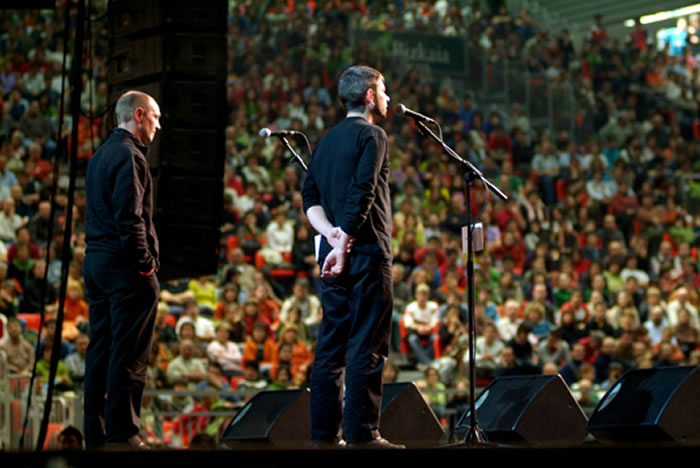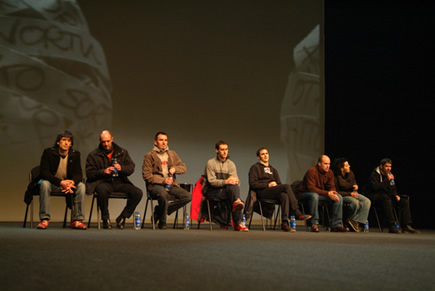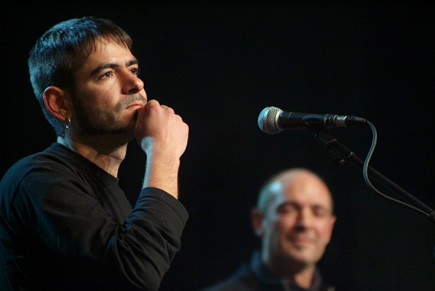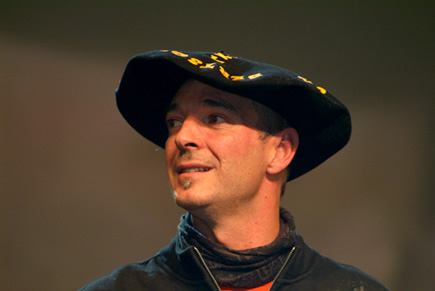
Basque Oral Poetry Championship
Imagine selling 13,025 tickets for oral poetry. Imagine further an entire 6-7 hours of live performances broadcast on regional television as they happen, with excerpts, summaries, and expert commentary on national television. Imagine a one-day event — the final act in a multi-stage, four-year, Olympian drama of qualification and elimination &mdash galvanizing ethnic, national identity to a degree unparalleled virtually anywhere in the world. Imagine the confluence of all of these phenomena and you have the Bertsolari Txapelketa, the national championship of bertsolaritza, the improvised contest poetry from Basque oral tradition, which took place in Barakaldo, Spain, on December 18, 2005.
The rules for competitive bertsolaritza are at once straightforward and extremely demanding. An emcee reads a topic or prompt to the contestants, who then have a few seconds – usually less than a minute – to assemble an 8-12-line poem along the pattern of a prescribed verse-form that also involves a rhyme scheme. Melodies are chosen from among hundreds of traditional tunes. In other words, poets must fit their unique, never before realized ideas into a highly complex framework of rules and patterns, and they must accomplish all these tasks concurrently in extemporaneous performance. That’s a lot of balls to keep in the air all at once, so bertsolariak must be expert jugglers.
Speaking of balls, organizers chose a rolled-up ball of paper with words scribbled on its strips as the icon for the 2005 championship.

I heard three explanations of this memorable image, all purportedly from the mouths of the oral poets themselves. Some people saw it as a symbol of the transience of the oral poem, carefully constructed and delivered but then discarded like trash; the moment of performance was what mattered, they were saying. The poem lived as an experience in time, not as a timeless artifact. A second group suggested an opposite perspective on the process but a similar basic concept, namely that the ball represented a nest of ideas opened up in performance, so that individual words became actual poetry only during the process of singing – only as the ball was unrolled. The third explanation held that these balls of paper/poetry were in fact the bertsos, the poems themselves, tossed back and forth between dueling competitors. As we shall see, this last interpretation reflects the direct verbal combat that lies at the heart of bertsolaritza.
As the opening session of the championship final began, and amid energetic strains of techno-pop that flooded the arena, the eight finalists marched to the stage. To honor these heroes of oral poetry-making, let me name them in an “epic catalogue” in the order they appear in the photo below (left to right):
- Igor Elortza Aranoa
- Andoni Egaña Makazaga (the current and three-time champion)
- Jon Maia Soria
- Amets Arzallus Antia
- Sustrai Colina Acordarrementeria
- Aitor Mendiluze Gonzalez
- Maialen Lujanbio Zugasti (the 2001 runner-up)
- Unai Iturriaga Zugaza-Artaza

Seven men, one woman (Maialen) – a reflection of this oral poetry as until recently primarily a male genre, but also a sign that more and more women are performing, and performing very well. In this and many other ways bertsolaritza is adapting to and documenting social change.
To get a sense of the strong cultural underpinnings, it is important to take account of what didn’t actually occur on December 18th, but serves as the crucial background for the quadrennial ritual. The 47-month backstory, if you like. In fact, even the regional competitions that serve as the opening rounds of progressive eliminations, gradually yielding the chosen eight for the finals, themselves represent only a part of that backstory. To understand the power and presence of bertsolaritza, we need to realize that the art and practice of oral poetry is woven very deeply into the fabric of Basque society, in both formal and informal settings and on a virtually everyday basis. Perhaps the most intimate of such settings is the ubiquitous “bertso-dinner,” a city or village ritual that features a community feast followed by performances by two or more bertsolariak, who duel not for prizes or glory but for the enjoyment of all those present. More than one thousand of these oral poetry feasts take place each year, I was told.
When I accompanied friends to a bertso-dinner in 2004, I learned something of the complex, recurring context that these events provide. One of the bertsolariak performing that evening was Maialen Lujanbio, the sole woman among the eight heroes catalogued above. She and her opponent-for-the-occasion had been hired through an agency run by Bertsozale Elkartea, an organization formed in 1986 to support Basque oral contest poetry in all of its dimensions – cultural, historical, economic, academic, and whatever other aspects need attention. Before the meal began, the guest poets circulated freely throughout the gathering of 40-50 townspeople, picking up tidbits of local color and personal anecdotes that they would later use during their performance to amuse their hosts. I found myself hoping that colleagues in Bertsozale Elkartea would someday research and write a full ethnography of a bertso-dinner, from the initial arrangements many months before the event through the long-planned and much-anticipated night of performances. Such a longitudinal perspective would help us grasp the central role of oral poetry in this society.
At any rate, suffice it to say that the championship finals rest on established social practice, and that bertsolaritza is an everyday as well as a quadrennial vehicle for entertainment and commentary, and for declaring and reaffirming Basque national identity. It is, in other words, a continuous tradition with many diverse manifestations throughout the cultural scene.
Now back to December 18th, about mid-day, and the much-awaited entrance of the eight finalists. The ritual begins with extemporaneous improvisations of greeting, as each contestant uses the medium of oral poetry to welcome the audience – both the 13,025 in attendance and the 100,000 watching live – to the event. Their bertsos (“verses, poems”) range from professions of modesty (“it’s a pleasure to take part, no matter what the outcome”) to solicitations of support (“please take pity on me”) to expressions of gratitude and even to bold warnings directed toward the favorite (“Andoni, we’ve come to challenge you”). In terms of ready adaptation to variant settings, bertsolaritza is reminiscent of the praise-poetry of the Xhosa and Zulu peoples of South Africa, which is tailored to particular chiefs and more recently to political figures both positive and negative, and to the pre-dinner toasts I experienced during fieldwork in Mongolia, extemporaneous poems composed by oral poets and chronicling the guests, their countries of origin, and other details.
With this joint prologue accomplished, the verbal warriors turn to their jousting in earnest. For each of the specific contests that follow during the first (11:00-14:00) and second sessions (16:30-19:45), the emcee will prescribe a topic or scenario, which serves as a prompt for the bertso, and in addition the verse form and number of iterations. The particular melody – and some 3000 have been recorded across the larger tradition – is in part determined by the verse form. While it’s conceivable that the greeting poems (for which neither prompt nor parameters were prescribed) could have been partially pre-composed, what follows them now couldn’t possibly be prepared in advance. What takes place from this point onward is improvisation in the true sense of the term, improvisation made possible by fluency within the multi-dimensional compositional language.
For example, the first prompt, given to Igor and Andoni, runs as follows: “You are workmates. After a labor strike of two years’ duration is finally settled, the bell rings in the locker room and you are called to work.” The emcee then prescribes the verse form (leaving each bertsolari to choose an appropriate melody) and indicates that they must compose competing poems for a total of three cycles (three sequences of bertsos). Here’s a précis of their collaborative, dueling response:
Igor: Friend, I’m not so happy to be here, but we’re two workers, so let’s be gentlemen.
Andoni: We’ve had a major struggle, and in the end achieved something – probably not enough, but let’s continue to work like donkeys and make the best of things.
Igor: Yes, we’re going back there to work for our bosses; like donkeys we bear our burden.
Andoni: Not all our objectives have been attained, but we haven’t bowed down; our backs are still straight.
Igor: The union and the militants have had time enough – I don’t want to end up working like a donkey on four legs.
Andoni: You’re sad. I’m not completely happy either. Let’s hope we can eat our sandwiches soon.
While the judges privately mark their scores based on the quality of the poetry, the performance, and the singing (no gestures are allowed in this tradition), three more pairs of dueling poets step to the microphone, one twosome after the next. The fourth pair, Maialen and Unai, both of whom will eventually finish very high in the standings, are assigned one of the most evocative topics of the competition, and they handle it with great dexterity and wit.

Here is the scenario: “You are the parents of three young children, and for the first time in a long time you have the opportunity to spend the weekend together without your children.” Once again the verse form is prescribed, the melody is open (though of course limited by the verse form), and the contestants are asked to produce three bertsos each. A summary of their memorable exchange runs as follows:
Maialen: Not one, not two, but three! We’re always thinking of how to get rid of our children, but now that we’re on our own we don’t know what to do with ourselves.
Unai: Yes, we had lots of money until the three children arrived. But, dear, how did we go about this sort of thing in the past?
Maialen: We start and finish with three children. My husband, you always have an excuse because of your job; you can’t tell the difference because you’re always busy.
Unai: Oh, I feel something warm! There goes the cell phone – I’ll bet it’s your mother calling us again....
Maialen: My mother’s always calling at the wrong time. I’m not sure what’s warming up – is it what you have on your shirt [the “18/98 plus” symbol associated with Basque nationalism]? I have three-plus children [her husband is also a child]!
Unai: That’s how things go. My oven is boiling; you’re exciting me even though you’re angry.
In these as in so many other instances all afternoon and evening, the oral poets are called upon to wrestle with difficult, many-faceted scenarios that are at the same time familiar human commonplaces. Family, society, ethnicity, and politics are the favorite topics, and bertsolariak must give their thoughts a lyrical and appealing spin even as they navigate the demanding series of formal verse and musical requirements.
For their part, audiences leave little doubt about whether or to what degree they approve of the poets’ best efforts. Sighs of delight and surprise punctuate the well-received bertso as it draws to a close, and each poem is accorded a clear, unequivocal evaluation, all the way from polite, unenthusiastic applause through footstamping, screaming support. And 13,000 voices can register quite an impact!
Another dimension of performer-audience interaction is especially striking. Because the tight pattern of rhythm and rhyme will dependably illuminate the horizon of the last few lines before the poet ever performs them, the audience very often sings these never-before-uttered lines in unison with the bertsolari even as he or she makes them. And in a show of worthy sportsmanship typical of every aspect of the event, each poet’s competitors regularly do the same, with a generous smile of appreciation on their faces. As I listen to the audience and try to gauge their criteria and preferences, I remember a discussion with two colleagues, Koldo Tapia and Joxerra Garzia, about the effects of mass media on this performed oral poetry, and try to imagine what reactions are taking place across the much-expanded virtual arenas of live television and radio.
 With round one behind them, the bertsolari now move on to improvised poetic debates that are designated formally as “polemics.” Consider the first prompt, with the emcee providing the same framework as above (different particulars, but a corresponding set of parameters prescribing verse form and cycles): “Andoni, you’re out late and you’re hungry when you come back early in the morning. So you’re eating the left-over squid in the refrigerator when your mother (Jon) walks in and catches you in the act.” Of course, the situation is rife with overtones: the young man living with his parents but naturally wanting to express his individuality and keep his own hours, the mother watching her son becoming a man at inconveniently close quarters, and so forth. Here is how Andoni and Jon handle the challenge:
With round one behind them, the bertsolari now move on to improvised poetic debates that are designated formally as “polemics.” Consider the first prompt, with the emcee providing the same framework as above (different particulars, but a corresponding set of parameters prescribing verse form and cycles): “Andoni, you’re out late and you’re hungry when you come back early in the morning. So you’re eating the left-over squid in the refrigerator when your mother (Jon) walks in and catches you in the act.” Of course, the situation is rife with overtones: the young man living with his parents but naturally wanting to express his individuality and keep his own hours, the mother watching her son becoming a man at inconveniently close quarters, and so forth. Here is how Andoni and Jon handle the challenge:
Andoni: What’s going on in the kitchen? Oh, good evening, mother, you’re wearing such a beautiful nightie!
Jon: My nightie’s as black as the squid you’re gobbling down!
Andoni: I think I’ve been sipping whiskey. But my lips are covered with ink; I suppose it’s because the squid has squirted me.
Jon: Squids squirt – let’s ignore that remark. Next time get out of bed in time for lunch instead of sleeping through it!
Andoni: Say whatever you want – I’m going to eat the squid now, and I won’t get up any earlier than 15:30!
Jon: You want to ignore me? Well, go ahead. When your father speaks with you, things will get really complicated.
Andoni: I want to eat the squid right now. Here, let me give you a kiss.... Oh, sorry, I’ve left an ink-stain on your face.
Jon: Yes, you’ve stained my cheek! Next time, instead of having me work so hard [preparing food], just call Tele-Pizza!
This exchange reveals the heart and soul of bertsolaritza as a contest. The two poets duel, casting contrary remarks back and forth, seeking to win the bloodless war of words by out-thinking one another. And through their linked series of bertsos run several common threads – the nightie, the squid, the color black, the ink, the daily schedule – that each competitor tries to twist to his advantage. That is, not only must each participant obey the rules of the verse-making game as dictated by the emcee, but he also has to echo the vocabulary and images used by his opponent. This “horizontal” strategy of echoing the opponent’s words, which lasts throughout the six-bertso series, is reminiscent of similar tactics in other oral traditions of verbal dueling, notably the early medieval English flyting (verbal combat) between Beowulf and Unferth in Beowulf or between Byrhtnoth and the inimical Viking messenger in The Battle of Maldon.
Three more polemics ensue, with topics ranging widely over matters of love and seasickness, jobs and status, and friends and money, and the other six participants respond to the prompts in reshuffled pairs. There’s a lot of humor involved, much of it stemming from the vivid portrayal of comically familiar behavior – problems and responses we all recognize. But there are occasional moments of unveiled social criticism, too, especially of the plight of powerless laborers in comparison to the comfortable, wealthy existence enjoyed by their bosses (at the workers’ expense, of course). Like the North American contest performances known as “slam poetry,” bertsolaritza serves as a vehicle for lamenting the ills of the common person, a platform for raising one’s voice in objection to the status quo. It often aims at exposing injustice in the hope that social maladies can be addressed and remedied.
The rest of Session One consists of “solos,” in which each competitor is given the first line of a bertso and required to create the rest; and the so-called “prison cell intervention,” in which the other bertsolariak are locked in a room so that they can't hear their competitors perform. Each person is asked to respond with three related poems on the following theme: “You hadn’t cried for a long time, but tears have just come to your eyes.” Responses are predictably various, as are the farewell bertsos composed as a ritual closure to this opening session. The audience heads out of the arena for their mid-day meal, with Amets’ bold reference to the reigning champion ringing in our ears: “I’m happy to crucify [Andoni] Egaña, though he’ll soon be resurrected.”
Over lunch my table of non-native enthusiasts conducts an informal poll to determine our favorites, and specifically to select those two bertsolariak we expect to reach the ultimate stage, a one-on-one competition at the very end of the proceedings. Most of us had listened to a Spanish translation of the performances; I and a few others heard a simultaneous English version, provided by Alfonso Vidal and Mikel Vidal and arranged by Kaldo Tapia. Our discussion is earnest, and our criteria are applied with as much expertise as we can muster; in the end, however, our conclusions prove only about half right. We settle correctly, as it turns out, on the eventual champion, the winner of the trophy and the cap, but only one of the twelve accurately picks the runner-up.

After the two and one-half hour break, the eight competitors return to battle, this time in a different sequence in order to vary the dueling combinations during the second session. Illustrating the “horizontal” structure of the ongoing competition, Andoni’s bertso of greeting refers back to the offhand remark uttered by Amets at the end of the first session: performing entirely within the traditional idiom, he observes that “I got off the cross because, as you understand, it’s really difficult to eat in that position.” In addition to responding wittily, his poem reveals a remarkable ability to harness the traditional form for a unique and present purpose.
During this first contest of the second session the following topic falls to Unai and Amets: “One of you is an old soldier, the other a young soldier; you are about to lose the battle, and the old soldier sees that his younger comrade is disheartened.” Their response is equal parts painful realism, social politics, and metaphor:
Unai: What a cruel fate we have! Why did we become soldiers? Better to have a wounded coward than somebody dead!
Amets: Don’t give me poetry when I’m in the middle of a battle – you have to carry on fighting!
Unai: What are you talking about? Everything has been decided for us in some office somewhere; we have nothing to say and nothing to do.
Amets: I have a wound, I’m bleeding – do you think that tears are better? Set aside your desperation! I prefer a white sheet to tears.
Unai: Leave the sheet – we are nobody’s dinner. Lie on the ground, pretend you’re dead, hold your breath.
Amets: Let’s not play tricks. I want to continue. If we lose, it’s because soldiers like you have no guts.
The second competition in this session involves a dueling contest in alternate lines, first one line by one poet, then the second by another, and so forth. Reminiscent of the African American verbal games of “the dozens” or more generally of certain varieties of rap (especially in competitive “freestyling”), these duels are prescribed to continue for a maximum of four exchanges. A couple of pairs get carried away and exceed the set limit, but no one seems to regret the spontaneous overflow.
The third bout requires each of the bertsolariak to compose three poems on a designated topic in a verse form of their choice. Although many of these cycles are impressive, one stands out as embodying the core political concerns of bertsolaritza. Here is the prompt given to Andoni: “You’ve been on holiday with your friends in Madrid, but you get separated from the rest of the group. You find yourself standing in front of the steps of the High Court of Justice.” After approximately thirty seconds’ pause, he offers three bertsos that we can summarize as follows:
- I was walking down by La Castellana Avenue and saw the north of the city, and all of a sudden I bumped into the steps. I may as well turn my back to the steps. I am perhaps the only Basque who has come up the steps without being summoned by the court itself.
- Shall I go inside or not? Perhaps I could, but then the judge might issue an order and sentence me to many years in prison. But I’ll go inside and make a statement, tell the judge everything because I'm "a know-it-all jester" [as the court had described bertsolariak some years before during a trial in which Andoni took part].
- I step inside. Perhaps the best thing is to turn around – making a statement was just a whim. I’d better not make a statement. I’m in danger now and I need to find my friends.
At this juncture a brief intermission now interrupts the proceedings, and the tension builds as the emcee thanks the judges, naming them one by one, as well as all who supported this event either financially or though volunteerism. This includes not only officials from various levels of the government, but most immediately the local associations linked to the bertso-schools in which children are educated in Basque and in the art and practice of bertsolaritza itself.
After a few moments the names of the final two bertsolariak are announced. To no one’s surprise, the first is Andoni Egaña; the second name, less universally expected but greeted with raucous and sustained applause, is that of Unai Iturriaga. So the final battle is set – Andoni versus Unai in a duel for the national title over a series of four challenges: two back-and-forth polemics, a bertso based on a “mystery word,” and a final solo on a new topic.
The first of the polemics takes shape around a popular song about Maritxu, a young woman, and her boyfriend Bartolo. The emcee gives the prompt as follows: “Unai, you are Maritxu. Your father has sent you to the fountain to fetch a bottle of white wine that has been cooling there. You happen to meet Bartolo (played by Andoni), who has discovered the wine and is very drunk.” It’s worth adding that even the reading of this topic gets a lively response among the audience, who eagerly await the two maestros’ comic exchange over familiar territory. Here is their encounter in paraphrase (and entirely unexpurgated!):

Unai (Maritxu): I’ve come because my father sent me. What a surprise to run into you! But we’ve missed an opportunity; you’re drunk!
Andoni (Bartolo): I’ve been tempted by wine. I started little by little, then I drank the whole thing. But I’m still capable of “ahem”!
Unai: Look at the kind of answer I get: he’s drunk but still willing to try a bit of “ahem”! You better put your head in the water first.
Andoni: You’re going to make me confess; ok, I’m a bit drunk, but Maritxu, you come closer and see where I put my head.
Unai: You’re randy, so we both feel like it – let’s make a deal: kneel down and you’ll see a rainbow.
Andoni: I got on my knees with the best of intentions to see what Maritxu had, but there was no rainbow – it was light, and then it was dark.
The second polemic is much more serious and generalized: “You have different world views: for Andoni the future of the world is bleak, while for Unai the future of the world is open and promising.” The two bertsolariak respond with pointed social commentary on subjects ranging from high-speed trains and shopping centers through third-world poverty and Basque politics.
Andoni then goes off-stage while the final two tests are administered to Unai. Since they will be addressing the very same topics, it’s crucial that the second poet not hear them posed to his opponent and thus have extra time to think and compose. Both competitors handle the bertso on the “mystery word” – which is simply “chair” – quite cleverly: Unai voicing his satisfaction that his chair is presently empty (because he is performing in the ultimate stage of the contest and is therefore closer to the cap and trophy) and Andoni mentioning a small chair for milking cows.
The final topic treats the problem of learning Basque and keeping the language and culture alive and thriving: “You work at a night school teaching Basque language to twelve people who are very tired after a full day of work but still want to learn.” Both poets speak eloquently about the challenge before their students and the solidarity of the group, and in the microcosm of these verses we can glimpse the outlines of a larger, comprehensive social movement.
And then suddenly it’s over.... After more than six hours of high-level juggling, of creatively and publicly meshing new ideas with the traditional patterns of Basque oral performance poetry, the bertsolariak are silent and the judgment goes to the jury. Soon the winner is announced, and for the fourth consecutive championship Andoni Egaña is victorious, this time over the runner-up Unai. Maialen places third, Amets fourth, Igor fifth, Sustrai sixth, Aitor seventh, and Jon eighth.

Fittingly, the ritual comes to a close with brief performances given by children attending Basque bertso-schools and by all eight of the competitors themselves. Without exception, the other seven are generous in complementing the victor Andoni, each in his or her own way. Jon asks “What can we do if you were born to be great?” and Sustrai congratulates “baldy” and looks forward to the next championship four years hence. Maialen observes that the planets seem to have been aligned in Andoni’s favor, but that the women are getting closer (she was second in 2001 and third this time) and she’ll be back in 2009. Unai congratulates all of the competitors but tempers his joy by remembering “the prisoners who couldn’t listen to us today.”
Finally, Andoni, who receives the champion’s cap from the great bertsolari Imanol Lazkano, past president of the association, sings his victory ode, mentioning most prominently “my children and the woman I love, with love to my mother and, with my Father’s permission, the mothers of us all.”

So ends an oral poetry event that is to my knowledge unique in the world. For the cheering thousands who came to Barakaldo, drawn by the cultural need to personally experience and co-create bertsolaritza, the event is manifestly fulfilling and inspiring. There is obviously great joy not only for the eight finalists, but for their 13,000 friends. Likewise for the 100,000 more who attended this “grand war of words” – in which no one was injured and everyone behaved honorably – via their radios and television sets, joining vicariously in this culminating celebration of Basque traditional identity.
I close with a word on context and tradition, which remain immanent after this particular instance of bertso-making has ceased. No matter how impressive these championships may seem, and they certainly were remarkably impressive in scope, process, and outcome, their power doesn’t derive solely from the grand but transient moment of the every-fourth-year festival. Not at all. That considerable power stems just as surely from the ongoingness and ubiquity of bertsolaritza, its long history and continuing significance in Basque culture. Whether on the “macro” scale of the filled-to-the-brim exhibition hall or within the much more modest, intimate setting of the local bertso-dinner, this remarkable oral poetry is simply doing what oral poetry always does: it works on behalf of society, on behalf of ethnic and community values, as an adaptive mechanism for negotiating the world. In a real sense bertsolaritza is the pulse of Basque culture, an index of what it means to be Basque – past, present, and future.
by John Miles Foley
Photos by Alberto Elosegi, for Bertsozale Elkartea


